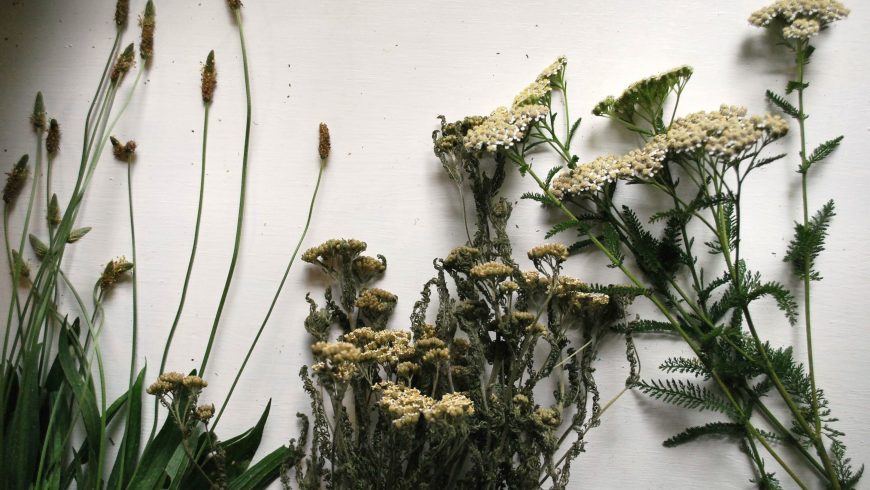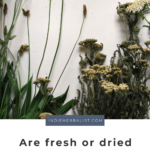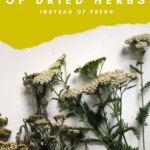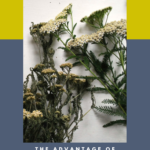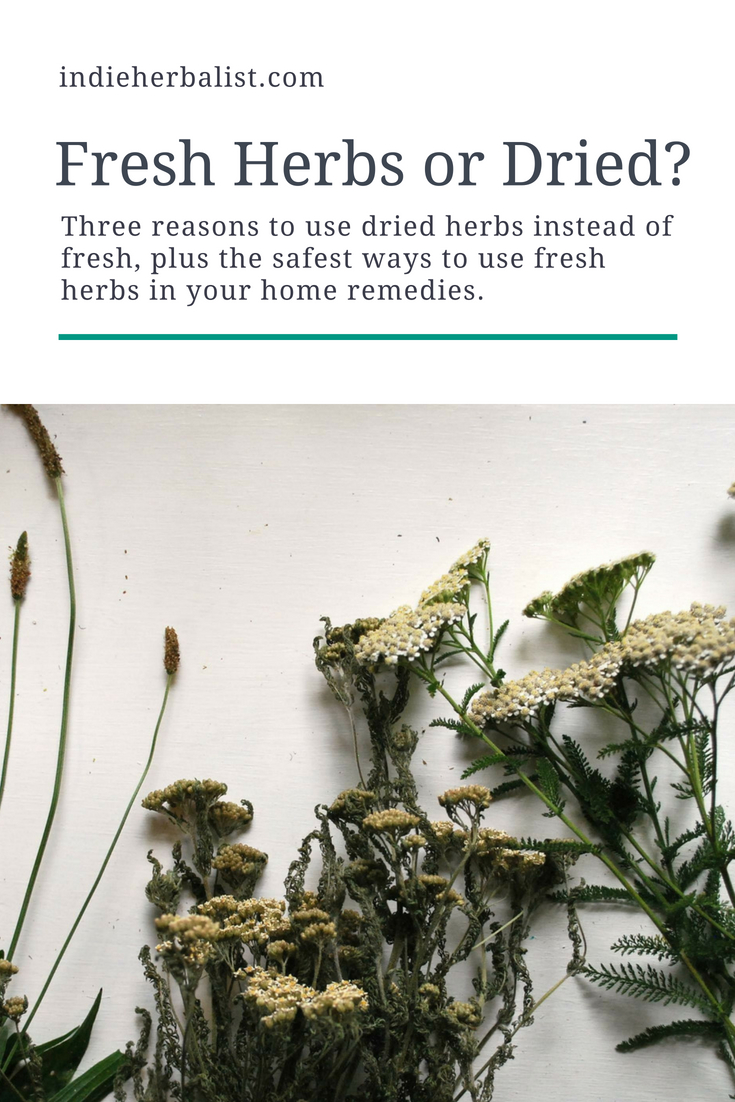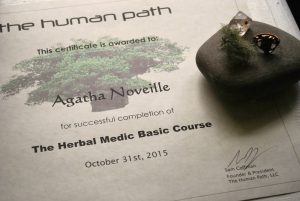Links contained in this post and elsewhere on my website may include affiliate links. When you make a purchase through these links, I earn a commission at no additional cost to you. I only link to products and services that I love - and that I think you will love, too!
Dried herbs are easier to obtain than fresh, but are you missing out by not having access to fresh herbs? Not at all! For several reasons, dried herbs are usually a better choice than fresh, especially when it comes to making extracts and infused oils. Here are three reasons to use dried herbs instead of fresh ones!
Dried herbs make stronger extracts
Fresh herbs are up to 80% water (Bone, 2003 ). Making an extract with fresh herbs means that your finished product will be weaker than one made with dried herbs. This can make them less effective unless you adjust the serving size. Removing the water by drying concentrates the beneficial aspects.
Dried herbs make stable extracts
The enzymes and water present in fresh herbs can make an extract less shelf-stable, plus the enzymes can cause different constituents of the herbs to break down over time. Drying the herbs stabilizes them to some extent. That’s why using dried herbs will increase the shelf life and the stability of the finished extract.
Also, you have to be careful that your extracts contain enough alcohol to compensate for the water in fresh herbs. Using something like 80 proof vodka, which is fine for dried herbs, can cause spoilage problems with fresh herbs because they contain water that further dilutes the alcohol.
Dried herbs make safer infused oils
Infused oils are used in cooking and also as the base for herbal salves, but fresh herbs can create a dangerous environment when they are combined. It’s a common misconception that herbs are “antibacterial” enough to prevent spoilage, but this is false (and potentially fatal).
Adding fresh herbs to your infused oils can set the stage for botulism- not a good idea! The University of Maine has a good food safety bulletin that explains more about botulism and infused oils.
If you’re curious about the related topic of “antibiotic” herbs, I have an article about that here: What you really need to know about antibiotic herbs.
Aren’t some herbs better fresh?
Some herbalists specify that herbs are best used fresh. Chickweed and cleavers are popular examples. I’ve used both herbs in both forms, and I’ve found that the key seems to be using freshly dried herbs. Neither chickweed or cleavers seem to have a very long shelf life as dried herbs.
Freshly dried lemon balm is the same way. In my experience, dried lemon balm from herbal suppliers loses its beautiful fragrance during storage. If I dry it at home, it retains it. You will most likely develop your own preferences as you work with different herbs in different forms.
If you want to preserve or use fresh herbs, here are some better options than making oils or extracts.
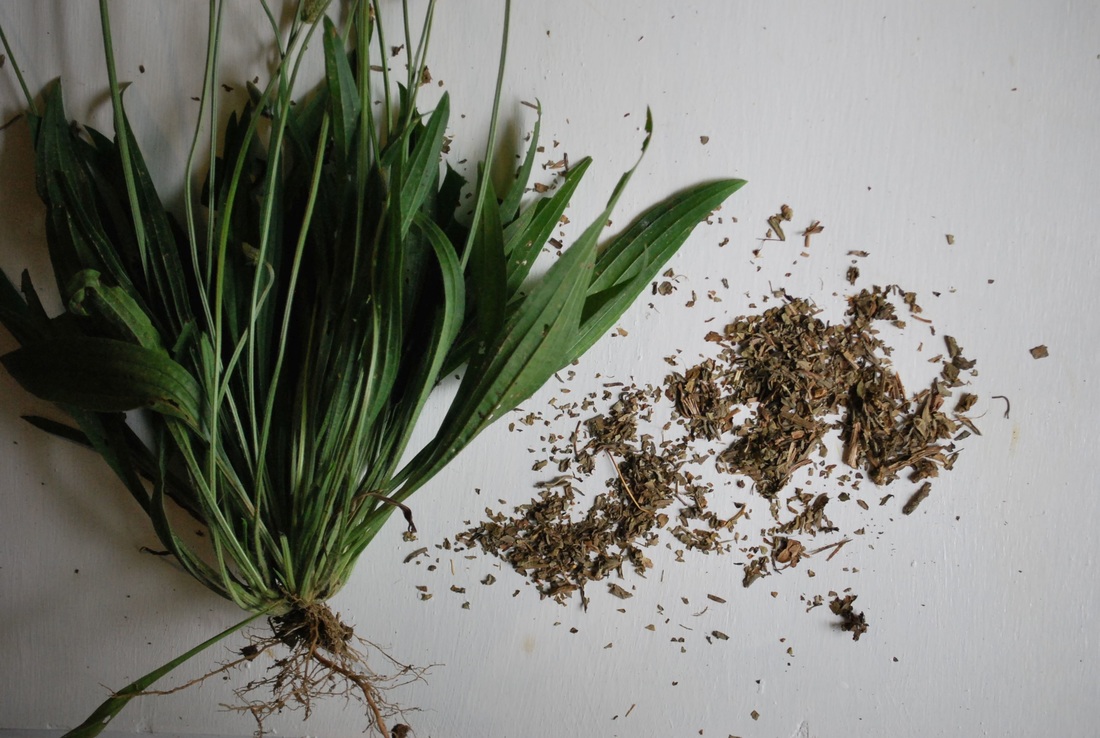
Sip herb juice
If the herbs are in season when you need them, juice them up! A juicer works well, but I also use the blender sometimes. Just add a little water to the herbs to help them blend down. Strain and store in the refrigerator, but try to make only the amount you will need in a single day- they don’t store well for very long.
This works best for cleavers, chickweed, nettles, mints, and other mild-flavored herbs that can be used as food. I wouldn’t recommend this for stronger herbs.
Freeze fresh herbs
I have juiced chickweed and cleavers and frozen the juice in ice cube trays and had really good results. The ice cubes can be added to water as a drink or thawed and used topically. These will last up to a year in the freezer, so you can make enough to have on hand for the rest of the year and then replenish your supplies when the herbs come back into season again.
This also works really well for tea herbs like lemon balm that you might want to use for infused water.
Make a succus
Succus (plural, succi) is herb juice preserved with alcohol. Juice your herbs or run them through a blender with a little water and press them through cheesecloth. Next, add Everclear or other high-proof alcohol. The ratio to use here is 3:1 (3 parts herbal juice to 1 part high proof alcohol).
Succi can be used topically or internally. Internally, the amount is the same as for tinctures. The finished alcohol content needs to be at least 20% for the succus to be preserved.
Should you use fresh or dried herbs?
Whether to use fresh or dried herbs is a personal choice and a matter of convenience. For the most part, I prefer working with dried herbs. I don’t need to worry about spoilage and my extracts and oils are more consistent and stronger. It’s an easy way to protect my investment of time and other ingredients. The reliability and longer shelf life are a plus!
You may also enjoy reading my articles The Best Places to Buy Dried Herbs Online and How to Tell the Quality of Dried Herbs.
